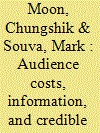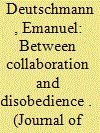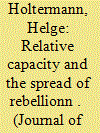|
|
|
Sort Order |
|
|
|
Items / Page
|
|
|
|
|
|
|
| Srl | Item |
| 1 |
ID:
144798


|
|
|
|
|
| Summary/Abstract |
Leaders who can accumulate audience costs can send costly signals that may help alleviate information problems associated with crisis escalation. We argue that research examining the effect of audience costs fails to appreciate the theoretical context in which audience costs matter. Audience costs may help alleviate information problems associated with international conflict. However, credible commitment problems are more central than information problems for some international conflicts. Theory does not expect audience costs to matter in this context; as a result, extant tests, and many criticisms, of the effect of audience costs on crisis escalation are flawed. We offer a more appropriate test of the effect of audience costs on crisis escalation. Consistent with extant theoretical arguments, we find that audience costs only reduce the likelihood of conflict when credible commitment problems are not the dominant concern motivating a dispute or crisis.
|
|
|
|
|
|
|
|
|
|
|
|
|
|
|
|
| 2 |
ID:
144803


|
|
|
|
|
| Summary/Abstract |
This article examines the behavior of the Guantánamo detainees in terms of collaboration and disobedience and how it influences their chances of getting a release recommendation. Joint Task Force Guantanamo–authored memoranda on 765 detainees are used to create a network of accusations between detainees and an attribute data set, which are analyzed using multivariate regression and Kolmogorov–Smirnov tests. It is found that while the distribution of incriminating statements obeys a power law, 62.6 percent of all detainees do not incriminate anyone. Yemenis and Saudi Arabians heavily overcontribute regarding incriminating statements and disobedient actions, whereas Afghans and Pakistanis undercontribute. Disobedient behavior does not affect the likelihood of getting a release recommendation, except for hunger striking, which has a negative effect. By releasing information, detainees don’t improve their own chances of getting release recommendations but impair those of the detainees they implicate. Three different groups of detainees are identified whose behavioral patterns seem to follow distinct logics.
|
|
|
|
|
|
|
|
|
|
|
|
|
|
|
|
| 3 |
ID:
144797


|
|
|
|
|
| Summary/Abstract |
We present a new theory of interstate crisis bargaining. A country’s resolve is a function of intrinsic qualities of the government and external circumstances, both of which are unknown by the domestic electorate and the foreign country. When domestic political debate reveals that circumstances favor the use of force, the government can extract better terms than if circumstances are revealed to be unfavorable. The revelation of circumstances, however, exacerbates reputational incentives. Because governments can no longer hide behind unknown circumstances, voters can better discern the government’s type from its actions, strengthening the incentives to appear resolved. The model bridges the gap between audience costs and its critiques, showing how domestic audiences punish leaders for inappropriate policies rather than empty threats. At the same time, it highlights how the prospects for peace are worse if uncertainty about the circumstances is removed, suggesting that greater transparency does not always promote peaceful outcomes.
|
|
|
|
|
|
|
|
|
|
|
|
|
|
|
|
| 4 |
ID:
144799


|
|
|
|
|
| Summary/Abstract |
We experimentally investigate the effect of social identification and information feedback on individual behavior in contests. In all treatments, we find significant overexpenditure of effort relative to the standard theoretical predictions. Identifying subjects through photo display decreases wasteful effort. Providing information feedback about others’ effort does not affect the aggregate effort, but it decreases the heterogeneity of effort and significantly affects the dynamics of individual behavior. A behavioral model that incorporates a nonmonetary utility of winning and relative payoff maximization explains significant overexpenditure of effort. It also suggests that decrease in “social distance” between group members through social identification promotes prosocial behavior and decreases overexpenditure of effort, while improved information feedback decreases the heterogeneity of effort.
|
|
|
|
|
|
|
|
|
|
|
|
|
|
|
|
| 5 |
ID:
144802


|
|
|
|
|
| Summary/Abstract |
Intelligence about transnational terrorism is generally gathered by national agencies. I set up and analyze a game-theoretic model to study the implications of national intelligence gathering for the provision of domestic (defensive) counterterrorism when two countries are facing a common transnational terrorist threat. It is shown that, relative to a benchmark case where all intelligence is known by both countries, national intelligence gathering often leads to increased inefficiencies in counterterrorism provision. By extending the main model with a communication stage, I also explore whether the differences in information that may follow from national intelligence gathering will be overcome by intelligence sharing. If verifiable sharing is a viable option for each country, then full credible intelligence sharing can happen in equilibrium. On the other hand, if only cheap talk communication is possible, then it cannot.
|
|
|
|
|
|
|
|
|
|
|
|
|
|
|
|
| 6 |
ID:
144800


|
|
|
|
|
| Summary/Abstract |
This article implements an experimental test of a game-theoretic model of equilibrium profiling. Attackers choose a demographic “type” from which to recruit, and defenders choose which demographic types to search. Some types are more reliable than others in the sense of having a higher probability of carrying out a successful attack if they get past the security checkpoint. In a Nash equilibrium, defenders tend to profile by searching the more reliable attacker types more frequently, whereas the attackers tend to send less reliable types. Data from laboratory experiments with financially motivated human subjects are consistent with the qualitative patterns predicted by theory. However, we also find several interesting behavioral deviations from the theory.
|
|
|
|
|
|
|
|
|
|
|
|
|
|
|
|
| 7 |
ID:
144801


|
|
|
|
|
| Summary/Abstract |
This article explores how insurgencies emerge and spread within a country over time through an analysis of the Maoist insurgency in Nepal. It argues that important processes underpinning the spread of insurgency are likely to change with shifts in the relative military capacity of belligerents. Importantly, insurgents can to a greater extent spread the insurgency by using coercion, material incentives, and movement of forces when they are militarily strong than when they are weak. This in turn leads to changes in the local conditions favorable to insurgency. I hypothesize that inaccessible terrains, preexisting rebel networks, and proximity to insurgent areas are likely to be important determinants of local insurgency onset during rebel weakness, but should decline in importance as the rebels gain strength. I find support for these arguments in a mixed-methods analysis of Nepal’s insurgency that combines a qualitative narrative and a quantitative event history analysis.
|
|
|
|
|
|
|
|
|
|
|
|
|
|
|
|
|
|
|
|
|